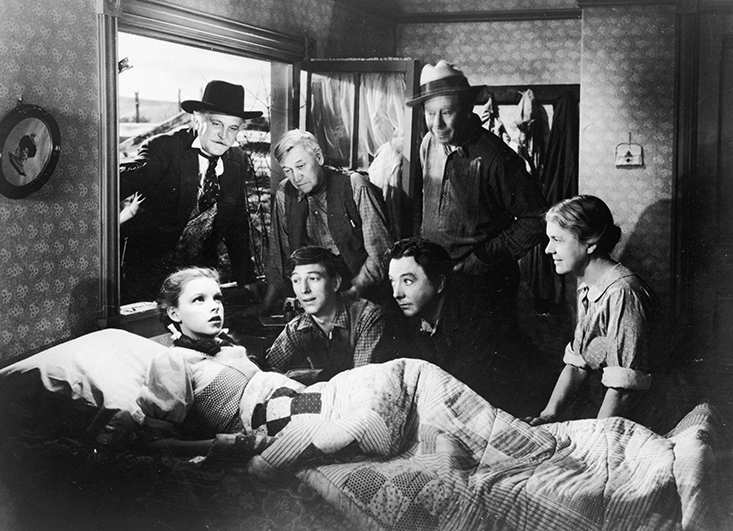Halfway through director Alfonso Cuarón’s Gravity, Sandra Bullock suffers the most cosmic case of homesick blues since Keir Dullea was hurled toward the infinite in 2001: A Space Odyssey nearly half a century ago. For Bullock, home is (as it was for Dullea) the Earth, looming below so huge it would seem she couldn’t miss it, if she could somehow just fall from her shattered spacecraft. She cares about nothing more than getting back to where she came from, even as 2001’s Dullea is in flight, accepting his exile and even embracing it.
Science fiction has long been distinguished by these dual impulses—leaving home and returning—when it’s not marked by the way that home leaves us, or deceives us when it’s no longer the place we recognize once we’re back. As a genre, science fiction has become the cultural expression of how progress and technology by definition distance us from what we recognize, turning the home that once was a sanctuary into a prison when we feel confined and then a destination when we’re lost. Earth-bound, claustrophobic, curbed by our dimensional limits, we’re compelled by the imperative of exploration; far-flung, rootless, untethered to reference points, we covet the familiar where we believe we’re safe, even if the familiar never really was all that safe.
Through intersecting themes of estrangement, memory, and exodus, science fiction, more than any art form, means to destabilize surroundings that are already precarious and constantly refine the nature of reality and what it is to be human. In the same way that science answers what’s previously unfathomable, science fiction confronts the established and traditional with which home is synonymous, challenging us to speculate on what might have been or what could be while where we live, which is the present, is transformed into the terrain of the future, where we’ve never been. The science fiction imagination is a nomad on an endless expedition and the result is a literature of the psyche, torn between the heart that yearns for home and the mind too restless to stay still.

Estrangement
In the first science fiction story, whose title novelist Arthur C. Clarke and director Stanley Kubrick would borrow for their own odyssey three millennia later, Ulysses departs home for glory in the Trojan wars, then overcomes one fantastic obstacle after another to arrive back in an Ithaca that’s no longer the place frozen in memory. In Gulliver’s Travels, Jonathan Swift’s hero impatiently sheds his known turf for the high seas and Lilliput only to escape to the home he thought he was escaping in the first place, where he finds himself more estranged than when he went. In The Wonderful Wizard of Oz, both the L. Frank Baum novel and the classic 1939 movie, the pull to home is so strong that Dorothy would happily give up a spectacular new residence of Technicolor marvels for the black-and-white, cyclone-blasted Dust Bowl and the preternatural inkling that the Kansan flatlands are where she belongs. All of these stories figure that home is where the heart is, until the heart finds its own coordinates in doubt. In the nuclear age home is that much less reliable, with the last half of the 20th century belying much more aggressively the security that always was an illusion—assuming home isn’t the storm cellar or bomb shelter from which we emerge to find the house gone once the squall passes.
In the 1950s, with atomic tests going off over the nearest ridge—dry runs for Armageddon—the now recognized giant of late-20th century science fiction, author Philip K. Dick, wrote some of his strangest books before succumbing to the publishing pressures of pure genre. These were surveys of the newly surreal suburbs that were a phenomenon of the post-War years. As conveyed by Dick’s Confessions of a Crap Artist and The Man Whose Teeth Were All Exactly Alike, suburbia fetishized the idea of home as it had lodged itself in the American dream—the manifestation of refuge and order and success where everyone went quietly nuts in the view of Dick, who was a little nuts himself: “We don’t feel at home anywhere we go,” he declares in Crap Artist’s opening lines. The traveling salesman of In Milton Lumky Territory returns home to fall in love with an older woman who, he comes to realize, was the second-grade teacher he detested; When she reduces his adult life to rubble much as she did his childhood, he retreats into a long reverie that ends the book where he and the ex-teacher find domestic happiness.
This subversive evocation of home—as an ideal that enthralls us in defiance of its reality, that continues to lure us even when every impression of home has been betrayed—later informed much of Dick’s more straightforward science fiction work of the ‘60s and ‘70s such as Dr. Bloodmoney, in which an earth consumed by nuclear conflagration leaves forsaken in space an astronaut who has only his survivor’s guilt to keep him company, and Flow My Tears, the Policeman Said, where the eponymous cop wandering the skies like a Flying Dutchman has too irrevocably fouled his own nest to resume his place there.
In the 1950s, with atomic tests going off over the nearest ridge, Philip K. Dick wrote, “We don’t feel at home anywhere we go.”
If the ’50s didn’t invent alienation (a pretty fancy word in those days), the decade identified it and then the ’60s and ’70s ran with it. In J. G. Ballard’s novels Concrete Island and The Drowned World, home becomes more contrived and artificial as it becomes less credible and steadfast. The eponymous structure of Ballard’s High Rise is home at its most hermetic, offering everything its inhabitants need or want, but as the building’s boundaries become a quarantine, the social contract within breaks down, “the psychology of high-rise life…exposed with damning results.” In Ballard’s work we’re left to our own psychological construct of home which is less organic and grounded: “Living in high rises required a special type of behavior, one that was acquiescent, restrained, even perhaps slightly mad.” In Samuel Delany’s mammoth Dhalgren, the city as a vast metropolitan home literally is a thing of words, as solid or ephemeral as words can be, a notion that 20 years later Mark Z. Danielewski would explode in his textual fantasia House of Leaves, where the Dr. Who-like abode that’s bigger on the inside than on the outside is fashioned from the pages of a book itself. By the ’80s the home writ large as a city no longer is the sum of parts: The Los Angeles of Ridley Scott’s Blade Runner—mutt urbanopolis with not a single natural element other than all its conflicting landscapes of sea and desert at war with each other—cancels out and replaces itself so rapaciously as to raise questions about the humanity that built it.

Memory
All great cities take on an identity of their own so overwhelming as to become oppressive. But if “home” and “human” sound like variations on each other—“human” comes from the same Latin word as “earth”—the hometown no longer feels like home when it becomes something other than human. What it means to be human becomes gauged not merely by what’s experienced but something more acute: In Dick’s novels (including the one that was the basis of Blade Runner) that measure is what is remembered. In his dying moments, Blade Runner’s murderous android played by Rutger Hauer lapses into a rhapsodic recollection that may or may not actually be his own, but by which he achieves humanity just by virtue of how much it moves him. Home is another name for the most profound of memories.
As the deprivation chamber of their craft severs their deepest bonds, the travelers of Stanislaw Lem’s novel Solaris find home has followed them in the form of memories they can bear to neither conjure nor relinquish, something progressively more metaphysical in the Andrei Tarkovsky screen adaptation and the Steven Soderbergh remake. “Where are we?” a startled cosmonaut asks the apparition of his dead fiancée, and when she answers, “At home,” he says, “Where’s that?” The banished begin to assume responsibility for their banishment; they’re afflicted by remorse for, first, having departed home so fecklessly, and second for whatever readjustments they begin to make when they can’t complete the round trip, even if the failure isn’t theirs. Solaris’ cosmonaut is pursued by the anger and culpability that attended the fiancée’s suicide back on the Earth he shared with her. Pitched from that home, he becomes home unto himself—home at the speed of light but slower than the speed of grief.
Battlestar Galactica’s paradox is that the nearer its travelers draw to their new home, the less familiar everything becomes.
With every definition of home in shambles, it would be a wonder the homeless still feel so lost if it weren’t for the humanity at stake. Ulysses was beset by shame and self-reproach over not only his abandonment of home but home’s abandonment of him: This is the prototype of the science-fiction character who hovers suspended in an impossible state of deportation. For Bullock in Gravity, all those miles above Earth, reconnecting with home means surmounting the death of a daughter. In David Bowie’s song “Space Oddity,” Major Tom is doomed to the sad revelations of one lonely sunrise after sunset, until 11 years later he returns in the sequel “Ashes to Ashes” a junkie strung out over the heavens, corrupted and less innocent for his survival. The protagonist of Robert Heinlein’s novel Stranger in a Strange Land (for which the counterculture ’60s had a disproportionate regard) is an earthling come to Earth after being born and raised on Mars, his sense of home so discombobulated that his only recourse, apparently, is to become a messiah. Walter Tevis’ The Man Who Fell to Earth finds an extraterrestrial (played by Bowie in the Nicolas Roeg film) tumbling to our planet searching for a new world where he might bring his family, who are dying of a drought back on the old world; when the alien winds up marooned, with everything about the new residence an excruciating reminder that his family has been deserted to die, he mulls his dwindling options. “Old pathways,” he calls them, “to ancient homes and new deaths.”
Exodus
More than in any other magnum opus, the themes of estrangement, memory, and exodus converge in last decade’s television series, Battlestar Galactica. The crew and inhabitants of several starships led by the Galactica are the sole human beings stranded by the obliteration of their world at the hands of an artificial race that humans created to be slaves. When the Galactica sets off in search of a new home, the promised land is a place called “Earth,” so much a part of lore that no one can be certain it’s real, and the quest becomes all consuming—disrupting loyalties, rending relationships, testing democratic principles, calling into question faith and, most fundamentally, leaving people to suspect that not only their neighbors aren’t human but they aren’t either. Some, consequently, take their own lives.
As in the fiction of Dick, Lem, and Ballard, in Battlestar Galactica science and technology constantly mutate our perception of reality, home, and ourselves. Reading Ballard’s science-fiction novels, the British novelist Will Self writes that “we feel simultaneously several different forms of the Unheimliche; that uncanny sensation which Freud (a major influence on Ballard) defined as drawing its potency from its very closeness to what is familiar—or, literally, ‘homelike.’ ” Galactica’s paradox is that the nearer its travelers draw to their new home, the less familiar everything becomes, until their own bodies are least familiar of all; by the time they find home at the series’ conclusion, they’re the strangest of strangers in the strangest of lands. Galactica lays waste to not just spatial or even temporal latitudes but those intuitive: “There must be some kind of way out of here,” characters quote to each other, by the end of season three, from a well known Bob Dylan song that won’t be written for thousands of years. Over the course of a newly redefined eternity, Earth finally looms before them so huge it would seem they couldn’t miss it, if they could somehow just fall from their shattered selves.
Steve Erickson is the author of nine novels, including Zeroville and These Dreams of You, the film critic for Los Angeles magazine, and editor of the literary journal Black Clock for the California Institute of the Arts, where he teaches.
Photo: A scene from Warner Bros. Pictures’ dramatic thriller Gravity, a Warner Bros. Pictures release. © 2013 WARNER BROS. ENTERTAINMENT INC.


























